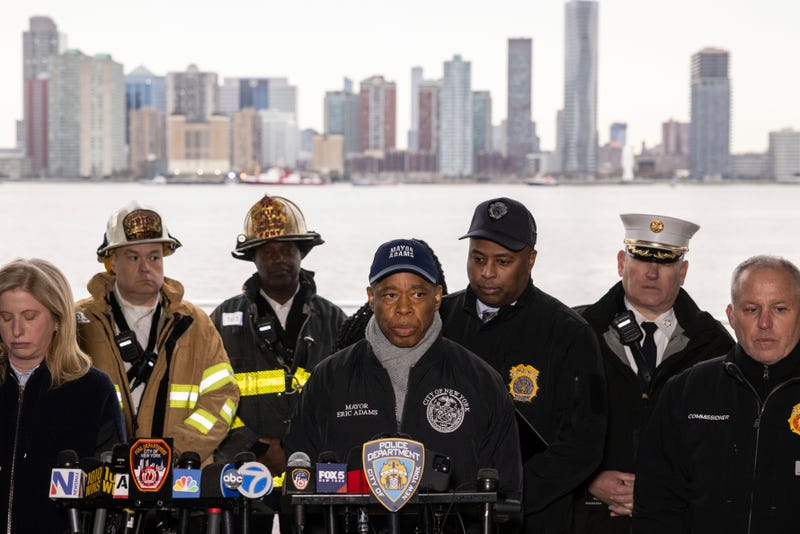
NEW YORK (1010 WINS) -- Mayor Eric Adams and FDNY Commissioner Robert S. Tucker spoke with 1010 WINS anchor Scott Stanford on Friday morning to discuss the latest on Thursday's Hudson River sightseeing helicopter crash that left a family of five and a pilot dead.
Amid renewed calls for tourist helicopters to be banned, Adams said the aircraft "play a crucial role" in the day-to-day life of the city. "We need to find out what happened," the mayor said, "then we should look and have conversations around the use of tourist helicopters."
INTERVIEW TRANSCRIPT:
A tragedy like this stings a little more when it hits our city?
ADAMS: No, so true. And we have witnessed throughout the last few months several incidents involving not only helicopters but planes, and it, you know, just gives you a little doubt. But you know we should be clear that air traffic for the most part is extremely safe and this investigation, which would be headed by NTSB, would determine exactly what happened here. They are professionals, and we know that air traffic is crucial not only for tourism but for business in the city. So we must make sure safety is paramount.
What are your thoughts on considering ban on tourist helicopters?
ADAMS: Well, the helicopter, use of helicopters I should say in this city is more than just tourism, it's also part of the business of moving CEOs and executives. We utilize the helicopters, travel, with the New York City Police Department, so they play a crucial role. And people come to the city because of the attractiveness of the city. We had 65 million tourists last year. We have thousands of flights using helicopters and tourism. People want to see the city from the sky. At the heart of this is safety. It must be done right. We must look at the maintenance record this helicopter. Wwe must look at the record of the pilot. And we need to find out what happened. And I think that is the first thing we do, and then we should look and have conversations around the use of tourist helicopters.
What do we know up to this point?
TUCKER: Look, you know, we don't know anything new this morning that we didn't know yesterday. The helicopter is now out of the water. The investigators from the federal government are here in New York and are doing their job as they always do. Just very proud of the FDNY team and the response and the choreography really that's based on our training together with the NYPD. I mean yesterday, albeit a very tragic outcome, really proved just how well FDNY and NYPD are working together both on land and in the water.
ADAMS: We also want to thank the New Jersey personnel, the first responders on New Jersey. This Tri-State coordination is so crucial when you have these emergencies, because anything could happen in densely populated cities, and if we don't coordinate with our law enforcement and first responders, partners, we won't be able to accomplish these missions of this magnitude.
Have you spoken with dive team, how do you help them cope?
TUCKER: Yeah, it's a really good point, and thanks for recognizing that. You know these members of the FDNY, the answer is yes, our chief of department and I and several staff chiefs from our department were at the Marine Company headquarters on the Hudson River shortly after this incident. We have a very active counseling services unit that deploys to incidents like this. You know, we're unfortunately dealing with tragedies frequently, and we've got an apparatus within the fire department to help our members both after critical incidents like this and just with their day-to-day trauma and stress.
How to ensure helicopter safety, do you feel safe riding them?
ADAMS: I don't think there is anyone that flies frequently that did not experience some turbulence. And you know when I'm on a helicopter from time to time, you feel the wind, you feel the turbulence, you feel the drop. You know, that's in the back of the mind of anyone who's taken either a plane or helicopter flight. What I say over and over again—these pilots are professionals. I have to trust in the maintenance record. I have to trust in the training for the pilots and you know allow them to do their job. And that's what we're going to do here. The NTSB and all investigators are going to determine again the maintenance record, the safety of the pilot's record. All of this is taken into account, and I don't think anyone does it better than the NTSB. And we're going to follow their lead in this area to make sure that air traffic is safe in our city.
